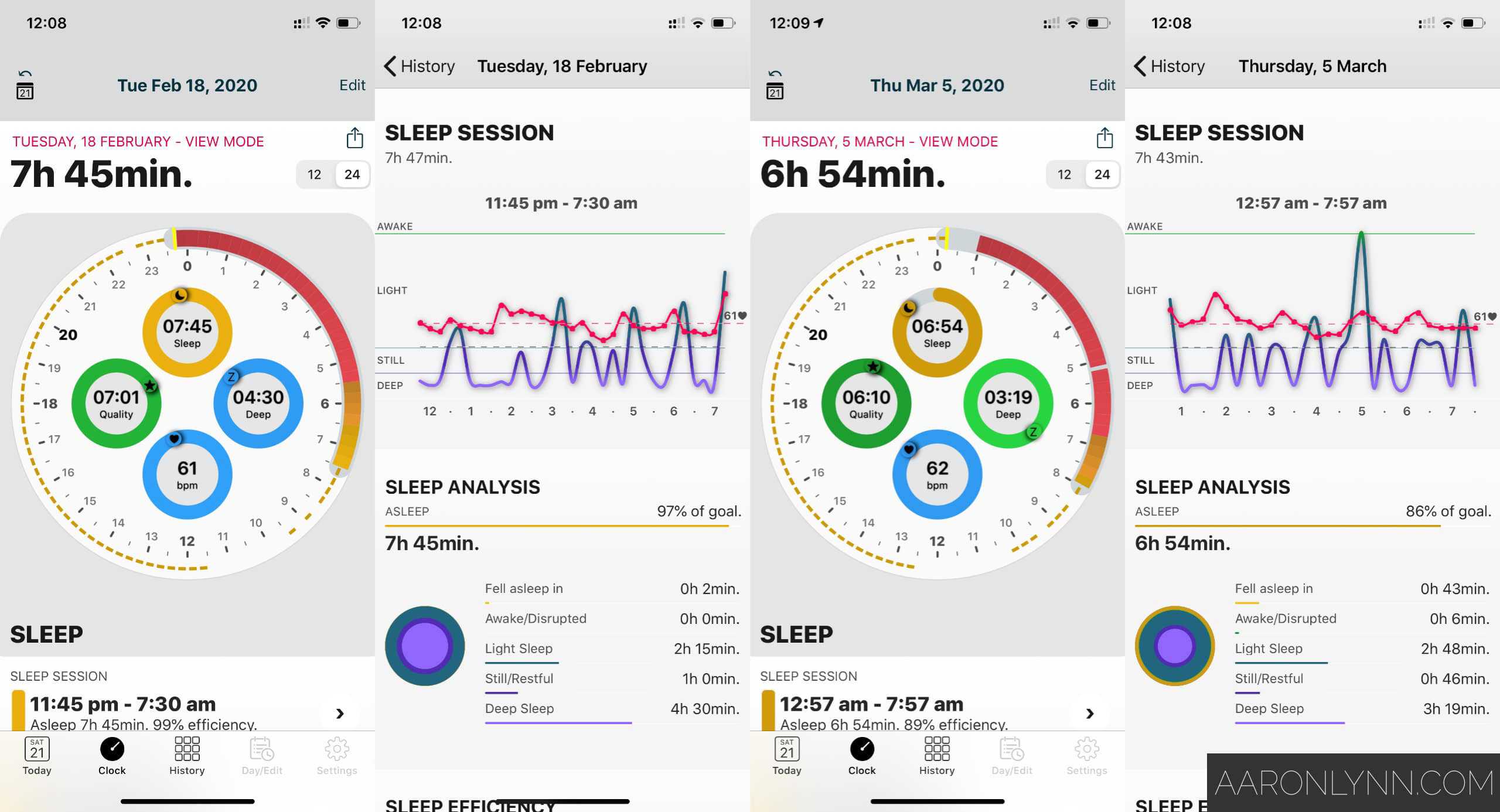
For as long as I can remember I have woken up at (or before) 5am.
To pull this off, I usually sleep pretty early – like 9pm or 10pm.
People are usually impressed at such a feat. Men think it’s awesome. Women swoon. My elders nod with hearty approval.
But is it possible to do better?
I have experimented with a lot of sleep schedules and hacks over the years – polyphasic, biphasic and various sleeping arrangements.1To be honest that sounds like a list of something completely and inappropriately different 🙊.
In my mind, none of them have ever replaced a good, full, standard seven-to-eight hours of normal sleep.
I recently completed one final experiment: sleep at midnight, wake at 8am.2The work-from-home internet-marketing schedule.
After thirty days of that, I stopped trying to hack my sleep and still wake up at 5am. Here’s what happened, and why.
Why Experiment and Hack Sleep?
Curiosity reasons
Sleep is one of the most important things in our lives. We don’t really understand why we need it, but we do know that without it things go bad really, really fast.
On average we sleep for about a third of our lives – so it’s a bit messed up if we don’t know how to do it properly.
Like others, I have read about people who sleep four-to-six hours a night and think “wow, that would be awesome”.
These people are our business and productivity superheroes. And so the question is – can other people do the same?
I also have friends and clients to whom I’ve suggested 5am starts who just can’t seem to do it. They keep telling me that they can’t sleep before midnight, or can’t wake up before 7am and whatnot.
For my final experiment and attempt to hack my sleep, I decided to try their schedule of sleeping 12am-8am and see if I could still keep things productive.
Practical reasons and rationalisations
To motivate myself to take on yet-another new sleep schedule, I came up with a list of “practical reasons”.
Whether these are legitimate or just rationalisations, they did help me prepare for and follow through on thirty days of a new sleep schedule.
Social reasons included:
- No longer turning down invites to dinners and drinks after 6pm.
- Not interfering with my work schedule for the following day if I had a late night.
- There is also a general social expectation where I live that everyone works on a 10am-6pm workday.
Staying up later also made it easier for me to work with people on different timezones.
Sleep Experiment Setup
I’m a systems guy. So when I experiment with something, I make sure that I set it up properly and try to optimise the f*ck out of it.
Here’s what I did.
First, I wrote down a new schedule. Like this:
8am - wake up, morning ritual. 9am - meditate, gym. 12pm - brunch + reading. 1pm - work. 7pm - dinner. 8pm - work. 11pm - evening ritual. 12am - sleep.
If I finished my workout earlier I would just come back earlier and eat/read/start work earlier.
Second, I made sure all my sleep hacks and hygiene were in place. This included:
- Environment – room temperature, blackout curtains.
- Bedding – comfortable mattress, sheets, pillows.
- No electronics in the bedroom.
- Lifestyle – maintain food, exercise, daily activity level.
- Supplements.
- Tech – tracking, dimmable lights, haptic alarm.
One of my curtains/blinds still seeped light, so I boarded it up with some inexpensive black cardboard.
Concerns With Experimenting With Sleep
I wrote down in my journal all the concerns I had going into the experiment.
They included:
- Would I be able to hit my most important task daily and retain the momentum of that?
- Would I retain my “morning clarity” effect for doing deep and focused work?
- Would my work quality change, especially when doing creative or technical work? There would be no point in adjusting things if I kept making mistakes with work.
Basically, I was concerned if I could maintain the same level of productivity and output once my schedule shifted.
There were a couple of things that I had no concern over:
- The ability to adjust to the new sleep/wake times. The above rationalisations and a bit of self-discipline would get me through that.
- Needing to wake up early one day for an exception. I ended up doing this a couple of times and it wasn’t a problem.
Sleep Experiment Logs
Here are some of my charts and logs from those thirty days:
Thursday 20 February 2020:
Generally feeling pretty OK. Maybe a bit sluggish in starting work? Not sure. Keep trying/adjusting.
Monday 24 February 2020:
1:30pm - when I sit down and start work it FEELS like 9am but clock says 1.30pm. Surprised me. This is a good thing because it means that body has adjusted and no real loss of productivity.
Wednesday 04 March 2020:
Noticing that writing does not flow as well for me in afternoon/at night as it does in morning. Perhaps need to change this up.
That last entry in particular will be important for later.
Sleep Experiment Results
After about a week, I managed to adjust to 12am-8am without any problem, and kept the experiment running for thirty days.
While there was no major dip in energy levels, what I did find was that I did not have as much clarity of thought upon waking up and during work times.
Some things I really liked were:
- If I had something on in the evening I actively knew that I would be giving up my 8pm-11pm work time for it. This is in contrast to before where I would go out for say dinner, rush home to get to sleep, and then take a productivity hit the next morning.
- If I had a late night, I no longer had a sluggish following morning. The next day would be “just normal”.
Some things I didn’t like were:
- Not being able to do early morning appointments or calls.
- Sunrise where I am is about 6am, so even with everything blacked out, light would still be seeping through for my last two hours of sleep.
- Morning noise, from traffic, the mosque nearby broadcasting prayers3The first being at 5:22am. On my prior schedule of waking at 5am this was not an issue. and the national anthem going off at 8am.
- The lack of clarity in early morning that I had before.
Sleep Experiment Conclusions
I did this experiment to see if I could adjust to a different sleeping schedule, and also to see if I wanted to continue tweaking my sleep schedule.
Here are the conclusions I reached.
First, respect your natural rhythm.
This is mostly for my friends and clients who complain they can’t get up early.
My advice is this: try it, and if it really doesn’t work for you after thirty days, then go back to what does.
My issue, is when they currently have bad nights of sleep and wish it could be better, but have never tried a different schedule.
Which brings me to my second conclusion.
Having a schedule in the most important thing.
It doesn’t matter if you sleep at 9pm, midnight, or even 5am.
Once you have worked out what your optimum seven-to-eight hours is, stick to it. Add in your morning and evening rituals, and stick to your schedule.
The worst thing for your sleep is to sleep and wake at different times every day.
Why I Won’t Be Hacking My Sleep Anymore and Why I Still Wake up at 5am
After the thirty days ended, I went back to my regular 9pm-5am sleep schedule.
This gives me the most energy, the best clarity of thought and super-productive mornings.
Sure, there are downsides.
I have to do early dinners and social engagements.
Sometimes I have a late night, end up sleeping a little less and need a nap the following afternoon.
But these are manageable.
I have also decided to stop experimenting with my sleep schedule and with hacking sleep in general. Instead I will just do my best to get seven-to-eight hours every night.
After trying many things, I’ve concluded that you can’t really physically sleep less and have it end well.4The exception being people with a gene mutation that allows for this.
Yes, we should all optimise our sleep hygiene.
And if there is a sleep hack that makes sense and you want to try it, go ahead.
But nothing beats just getting a good night of rest in the end.
What To Do Next
Sleep is important.
There’s a reason that energy and sleep are at the foundation of the productivity stack and time management stack.
You can (and should) experiment.
But once you have worked out your rhythm and schedule for sleep and optimised it the best you can, accept that you need sleep… and that it’s going to be like that for the rest of your life.
- To be honest that sounds like a list of something completely and inappropriately different 🙊.
- The work-from-home internet-marketing schedule.
- The first being at 5:22am. On my prior schedule of waking at 5am this was not an issue.
- The exception being people with a gene mutation that allows for this.
